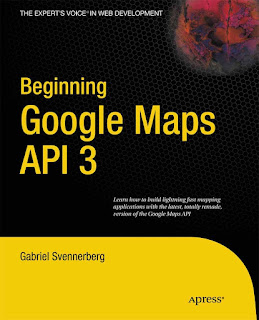Beginning Google Maps API 3 By Gabriel Svennerberg
Download
Introduction
This book started out as an idea in spring 2009. I had written quite a few articles and tutorials about the
Google Maps API v2 and thought that I could reuse them to write a book. That shouldn’t take too long, I
thought. Shortly after, during Google I/O 2009, Google announced that it was releasing version 3 of the
API. This release was a total remake of the old one, and I soon realized that I now had to write a book
about this version instead. This rendered my intital plan to reuse my old articles completely useless. I
also had to learn the new API; it was, after all, a complete remake. In retrospect, I’m glad that I did. The
new API has a much cleanear programming interface and is more well structured than the old one. It
just feels better to program with. And now that the book is being published, version 2 is deprecated,
and version 3 is the recommended alternative for new map applications.
Writing this book became a bigger undertaking than I first anticipated, but it has also been a lot
more fun and interesting journey than I expected (even if I’ve despaired at times). Writing this, my
first book, has been a learning experience. When I started the project, I had no clue how to go about it. I
didn’t now how to get it published or how to structure it. But it all somehow unfolded as the work
progressed, and here I am now, with a finished book.
My journey with Google Maps started in 2007, when I created my very first map. It was a map
showing the location of a restaurant. It not only let you see the location of the restaurant but also
allowed you to enter an address in a text field to get driving directions. Very cool stuff. Since then, I’ve
created a lot of maps using the API, not the least as part of my job as a web developer and interaction
designer at Saab Security Solutions.
My hope for this book is that you as a reader will be able to quickly grasp the concepts of the
Google Maps API so that you can create your own map solutions. In fact, after reading this book, I hope
that you’re not only able to create your own maps but that you’re also able to deal with many of the
common pitfalls most developers encounter when building Google Maps solutions.
Who This Book Is For
This book is primarily for web designers/developers who want to learn how to use the Google Maps
API on their own web sites. But even if you’re not in the field, you should be able to learn the concepts
since they’re thoroughly described. It certainly helps if you have a basic understanding of how to
create a web page and how the Web works, but other than that, you should be able to learn how to use
the API from just this book.
This book is also for those of you who have been using version 2 of the API. I’ve dedicated a whole
chapter for you, Chapter 2, where I explain the differences between the two versions so that you can
easily transfer your old maps to the new API.
Home Api Development Beginning Google Maps API 3

